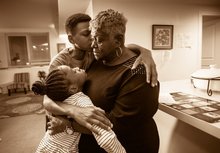0
News Article
Community:
Apr 4, 2019
Education Design Lab taps four large community colleges in an ambitious effort to raise single-mother completion rate 30 percent at each institution by 2024.
Authored by: Education Design Lab for Ciston PR Newswire
Topics: Dual-generation, Early childhood, Family engagement, Low-income, Metrics, Post-secondary
 Shared by Mica O'Brien
Shared by Mica O'Brien
Mica O'Brien posted a
on Apr 18, 2019
Education Design Lab for Ciston PR Newswire
Education Design Lab taps four large community colleges in an ambitious effort to raise single-mother completion rate 30 percent at each institution by 2024.
0
Report
Community:
Feb 1, 2019
In the summer of 2018, Ascend gathered more than two dozen state and national policy experts and other leaders in the fields of health and early learning at its Aspen Meadows Campus in Aspen, Colorado, to discuss the growing opportunity to leverage the 2Gen approach at the state level and determine how best to take promising new innovations to scale. This report offers a snapshot of specific things federal, state, and local leaders can keep doing, start doing, or stop doing to remove barriers and accelerate success.
Authored by: Ascend: The Aspen Institute
Topics: Dual-generation, Early childhood, Family engagement, Legislation & Policy, Research
 Shared by Housing Is
Shared by Housing Is
Housing Is posted a
on Feb 15, 2019
Ascend: The Aspen Institute
In the summer of 2018, Ascend gathered more than two dozen state and national policy experts and other leaders in the fields of health and early learning at its Aspen Meadows Campus in Aspen, Colorado, to discuss the growing opportunity to leverage the 2Gen approach at the state level and determine
0
News Article
Community:
Jan 22, 2019
A D.C. housing development serves as a refuge for grandparents raising young children. Is it a model for the rest of the country?
Authored by: Andrew L. Yarrow for The Washington Post
Topics: Child welfare, Dual-generation, East Coast, Family engagement, Low-income, Place-based, Seniors, Stability, Youth
 Shared by Mica O'Brien
Shared by Mica O'Brien
Mica O'Brien posted a
on Jan 22, 2019
Andrew L. Yarrow for The Washington Post
A D.C. housing development serves as a refuge for grandparents raising young children. Is it a model for the rest of the country?
0
News Article
Community:
Jan 10, 2019
Island School is one of 247 “community schools” in New York. These are regular public schools, with a twist. They have longer days and longer school years: Island stays open 12 hours a day, six days a week, including spring and winter breaks as well as the summer. A psychologist makes weekly rounds. A dentist comes by regularly. So does an optometrist, and students who need glasses get them free.
Authored by: David L. Kirk for The New York Times
Topics: Community development, Dual-generation, East Coast, Education, Family engagement, Homelessness, Housing, Low-income, Mental health, Metrics, Partnerships, Stability, Youth
 Shared by Mica O'Brien
Shared by Mica O'Brien
Mica O'Brien posted a
on Jan 10, 2019
David L. Kirk for The New York Times
Island School is one of 247 “community schools” in New York. These are regular public schools, with a twist. They have longer days and longer school years: Island stays open 12 hours a day, six days a week, including spring and winter breaks as well as the summer.
0
Report
Community:
Nov 1, 2018
The Colorado Division of Youth Services is working to transform the family experience by taking a two-generation (2Gen) approach to the services it provides.
Authored by: Tony Gheradini for Ascend: The Aspen Institute
Topics: Child welfare, Dual-generation, Early childhood, Family engagement, Low-income, Partnerships, Stability
 Shared by Mica O'Brien
Shared by Mica O'Brien
Mica O'Brien posted a
on Dec 13, 2018
Tony Gheradini for Ascend: The Aspen Institute
The Colorado Division of Youth Services is working to transform the family experience by taking a two-generation (2Gen) approach to the services it provides.
0
Report
Community:
Jul 19, 2018
As prospects seem to diminish for the next generation being
better off than the current one, it is essential to elevate the
successful work being done to address intergenerational
poverty and create an intergenerational path of opportunity.
Practical State Solutions profiles effective solutions from Ascend
partners throughout the United States and the work driven by
leaders in Colorado, Connecticut, Florida, Georgia, Maryland,
Minnesota, Tennessee, and Utah. It contains recommendations
on processes that lead to better outcomes for families, lessons
learned on engaging and bringing families to the table as
empowered experts, and information on how to move to
the next level whether you are starting your 2Gen journey or
working to go deeper.
Authored by:
Topics: Asset building, Child welfare, Criminal justice, Dual-generation, Early childhood, Family engagement, Funding, Health, Legislation & Policy, Post-secondary, Workforce development
 Shared by Housing Is
Shared by Housing Is
Housing Is posted a
on Jul 19, 2018
As prospects seem to diminish for the next generation being
better off than the current one, it is essential to elevate the
successful work being done to address intergenerational
poverty and create an intergenerational path of opportunity.
Practical State Solutions profiles effective solutions from
0
Report
Community:
Jul 12, 2018
We examined the influence of maternal health literacy on child participation in social welfare programs. In this cohort, 20% of the mothers had inadequate or marginal health literacy. Initially, more than 50% of the families participated in Temporary Assistance for Needy Families (TANF), the Food Stamp Program, and Special Supplemental Nutrition Program for Women, Infants, and Children, whereas fewer than 15% received child care subsidies or public housing. In multivariate regression, TANF participation was more than twice as common among children whose mothers had adequate health literacy compared with children whose mothers had inadequate health literacy
Authored by:
Topics: Child welfare, Dual-generation, Early childhood, Education, Family engagement, Food insecurity, Health, Housing, Low-income, Medicaid / Medicare, Nutrition, Pre-natal, Preventative care, Research, Stability
 Shared by Housing Is
Shared by Housing Is
Housing Is posted a
on Jul 12, 2018
We examined the influence of maternal health literacy on child participation in social welfare programs. In this cohort, 20% of the mothers had inadequate or marginal health literacy.
0
News Article
Community:
Jul 5, 2018
Authored by: Brittany Collins for Purpose Built Communities
Topics: Dual-generation, Education, Family engagement, Low-income, Mobility, Post-secondary, Youth
 Shared by Housing Is
Shared by Housing Is
Housing Is posted a
on Jul 11, 2018
Brittany Collins for Purpose Built Communities
0
News Article
Community:
Jul 5, 2018
"There's no silver bullet" to end chronic absenteeism, but a simple "nudge" letter has shown real success in reducing truancy. It's working in Tacoma, and it's caught the interest of the Seattle Housing Authority, which houses 10 percent of Seattle's public-school students.
Authored by: Neal Morton for The Seattle Times
Topics: Attendance, Dual-generation, East Coast, Education, Family engagement, Low-income, Research, West Coast, Youth
 Shared by Housing Is
Shared by Housing Is
Housing Is posted a
on Jul 9, 2018
Neal Morton for The Seattle Times
"There's no silver bullet" to end chronic absenteeism, but a simple "nudge" letter has shown real success in reducing truancy.
0
News Article
Community:
Feb 5, 2018
Graduation rates in Arkansas have improved for all racial groups under this program
Authored by: Meredith Kolodner for The Hechinger Report
Topics: Cost effectiveness, Dual-generation, Education, Family engagement, Legislation & Policy, Low-income, Post-secondary, Racial inequalities, South, Youth
 Shared by Housing Is
Shared by Housing Is
Housing Is posted a
on Jul 5, 2018
Meredith Kolodner for The Hechinger Report
Graduation rates in Arkansas have improved for all racial groups under this program
0
News Article
Community:
Mar 14, 2018
Education leaders reconvened on Tuesday to continue discussing how to help kids by helping their parents. The approach, known as the “Two-Gen” method is based on data showing a child’s trajectory is largely determined by their parents’ stability.
Authored by: Ryan McKinnon for the Herald-Tribune
Topics: Child welfare, Dual-generation, Education, Family engagement, Literacy, Low-income, School-readiness, Workforce development, Youth
 Shared by Housing Is
Shared by Housing Is
Housing Is posted a
on Jul 5, 2018
Ryan McKinnon for the Herald-Tribune
Education leaders reconvened on Tuesday to continue discussing how to help kids by helping their parents. The approach, known as the “Two-Gen” method is based on data showing a child’s trajectory is largely determined by their parents’ stability.
0
News Article
Community:
Jul 2, 2018
Poor children don't struggle in school because of their parents. They struggle because of poverty.
Authored by: Mical Raz for The Washington Post
Topics: Attendance, Child welfare, Dual-generation, Early childhood, Education, Family engagement, Food insecurity, Grade-level proficiency, Housing, Legislation & Policy, Literacy, Low-income, Out-of-school time, Post-secondary, Racial inequalities, Research, School-readiness, Youth
 Shared by Mica O'Brien
Shared by Mica O'Brien
Mica O'Brien posted a
on Jul 3, 2018
Mical Raz for The Washington Post
Poor children don't struggle in school because of their parents. They struggle because of poverty.
0
Report
Community:
Nov 1, 2017
Why do some neighborhoods appear able to launch effective local improvement initiatives, while others are more hampered by fragmentation and mistrust? Why can some communities mobilize diverse constituencies to influence public policy, while others cannot? Answers to these questions may be found in the specific patterns of collaboration that form among community organizations, and between these groups, schools, public agencies, and elected officials, according to MDRC, a preeminent social-policy research organization.
Authored by: MDRC
Topics: Asset building, Child welfare, Community development, Data sharing, Dual-generation, Education, Family engagement, Funding, Health, Housing, Legislation & Policy, Low-income, Metrics, Midwest, Mobility, Out-of-school time, Partnerships, Place-based, Preventative care, Research, Safety, Stability, Workforce development, Youth
 Shared by Mica O'Brien
Shared by Mica O'Brien
Mica O'Brien posted a
on Jun 29, 2018
Why do some neighborhoods appear able to launch effective local improvement initiatives, while others are more hampered by fragmentation and mistrust? Why can some communities mobilize diverse constituencies to influence public policy, while others cannot?
 Shared by Housing Is
on Feb 15, 2019
Shared by Housing Is
on Feb 15, 2019




 Shared by Housing Is
on Jul 19, 2018
Shared by Housing Is
on Jul 19, 2018
 Shared by Housing Is
on Jul 12, 2018
Shared by Housing Is
on Jul 12, 2018
 Shared by Housing Is
on Jul 11, 2018
Shared by Housing Is
on Jul 11, 2018
 Shared by Housing Is
on Jul 9, 2018
Shared by Housing Is
on Jul 9, 2018

 Shared by Housing Is
on Jul 5, 2018
Shared by Housing Is
on Jul 5, 2018

 Shared by Housing Is
on Jul 5, 2018
Shared by Housing Is
on Jul 5, 2018









